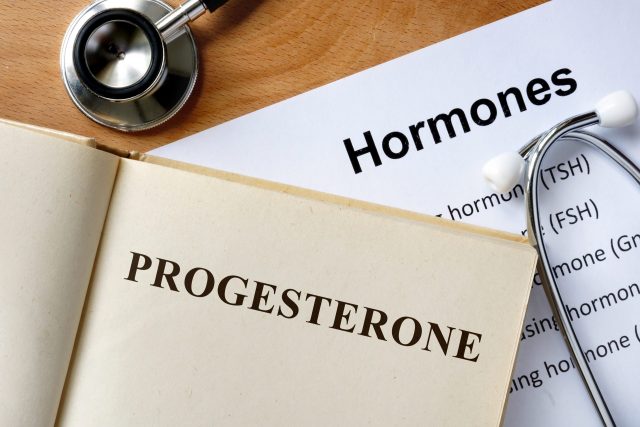

Listener’s Question: Hello, recently my Nurse Practitioner recommended that I should start taking progesterone because she mentioned that I was estrogen dominant. I don’t have any real symptoms, so just want to make sure if I even need to take the progesterone. Thanks.
Short Answer: If you don’t have any direct symptoms, then progesterone would not be necessary. We prescribe progesterone to women of all ages, but usually, they have a symptom profile that justifies the prescription. It is not likely for a woman to be truly estrogen dominant without any noticeable symptoms (fibroids, endometriosis, heavy bleeding, etc).
If a cycling woman does her blood work around day 12 of her cycle. The estradiol will be higher, and the progesterone level will typically be less than one (<1.0). It could appear to be too much estrogen compared to progesterone, but this is normal. A woman’s body does not produce any progesterone until ovulation, which typically occurs about day 14 of the cycle. This is why it is important to know what day of the cycle the lab work was done in order to interpret the estradiol and progesterone levels.
Once a woman enters the 40s, her body begins to change; however, we don’t prescribe progesterone simply based on a blood test. The patient’s symptom profile is a better indicator of whether or not to prescribe progesterone. Some of the common symptoms we look for are heavy periods, irritability, anxiousness, and poor sleep quality.
Generally, for a woman dealing with classic perimenopausal symptoms, we will prescribe 100 mg of bioidentical, sustained-release progesterone capsule taken at night 60 minutes before bed. This is a good starting point but may need to be adjusted based on the woman’s response. We do get a lot of questions asking about progesterone cream, but in our experience, it does not seem to be as effective at resolving perimenopausal and menopausal symptoms as oral progesterone.
For more information about progesterone, below are links to previous episodes.
PYHP 101 – Can I Take Progesterone All Month?
PYHP 111 – Does Progesterone Help With Perimenopause?
PYHP 113 – Can Progesterone Cause Dizziness?
If you have more questions about progesterone or other female hormone issues, feel free to contact us. We are here to help.
The post When Should A Woman Take Progesterone? | PYHP 118 appeared first on .
Discover the common and unfamiliar symptoms that you might be experiencing. Get access to cases of real women with hormonal conditions.

In this episode, we talk about hormone treatments for perimenopause and menopause. There is a vast distinction between perimenopause and menopause when it comes to treatment options. We often see women who are being treated for menopause when they are genuinely not in menopause. Meet Linda: Linda is a listener who sent us a question […]
Recently, Catherine posted a question on our website about Biest cream, and we knew this could interest our listeners. Biest is a combination of estriol and estradiol, one of the most common forms of estrogen therapy used in bio-identical hormone replacement. There are many doses, ratios, options, and methods of using Biest, so we thought […]
Welcome to the Progress Your Health Podcast! This is a podcast that helps you learn about balancing hormones, especially during perimenopause and menopause. We love hearing from our listeners. If you have a question, please visit our website and click Ask the Doctor a question. Let’s read Brigitte’s question! I have been listening and learning […]
In this episode, we talk about the difference between perimenopause and menopause. Both Dr. Maki and I (Dr. Davidson) have worked with women in perimenopause and menopause since 2004 and sometimes get a bit myopic and technical when it comes to explaining the differences. The other day, a patient of Dr Maki’s asked the question, […]
We recently got a great question from a listener and want to share it with you. This question is about a perimenopausal 51-year-old female. She is still menstruating and having confusion about her hormone testing and the hormone therapy that she is currently taking. She is experiencing some breast tenderness and irritability related to her […]
in this episode, we answered a listener’s question. We love questions from listeners. If you have a question, please visit our website and click Ask the Doctor a question. Here is the listener’s question: I have been perimenopause for at least 4 years now I am 47 and after completing a Dutch test with a […]